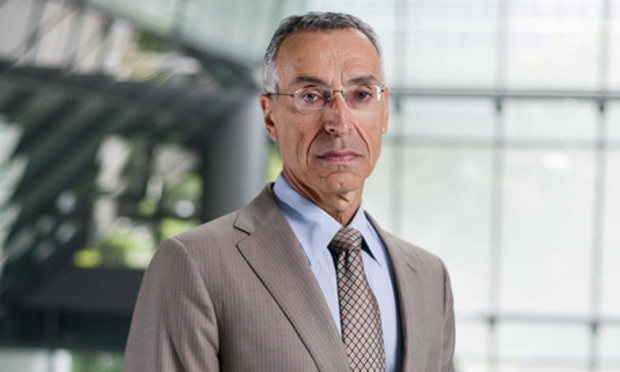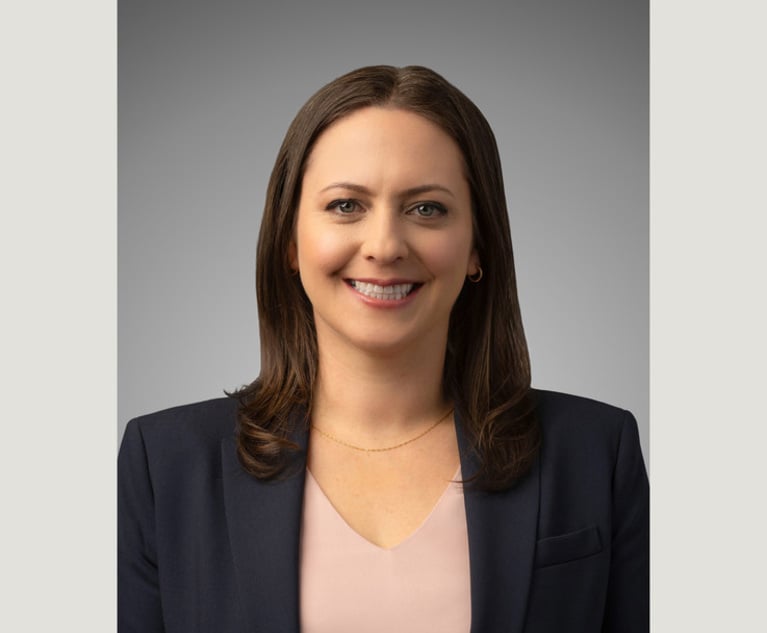Wilmer Cutler Pickering Hale and Dorr
As lawyers, we have certain skills, and using them on behalf of people for whom such help is otherwise unavailable helps to make the world a fairer, more just place.
April 30, 2019 at 11:59 PM
3 minute read
 Seth Waxman of Wilmer Cutler Pickering Hale and Dorr.
Seth Waxman of Wilmer Cutler Pickering Hale and Dorr.
Describe your firm's philosophy on pro bono service.
Wilmer encourages all lawyers, including new associates and summer associates, to participate in a wide variety of pro bono activities. We endorse the principle that every lawyer has a professional responsibility to use a portion of his or her time for pro bono legal service and recognize that pro bono work often exposes lawyers to types of legal and professional work that is not otherwise readily available.
Of the big cases your firm worked on, one included representing Robert McCoy in the McCoy v. Louisiana case. Tell us more about that case and how you reached the outcome.
McCoy was a fascinating, foundational case. As Mr. McCoy was under sentence of death, the stakes could not have been higher. Plus, the facts were so stark and the legal principle so arresting: Against Mr. McCoy's expressed wishes, his lawyer told the jury he was guilty. People have a sense that such an admission is improper, but identifying the relevant constitutional principle and its limits proved a challenge. Our principal argument was that criminal defendants have a Sixth Amendment autonomy right to not have their lawyers admit their guilt to the jury when they specifically instruct their lawyers not to. The justices based their opinion largely on this ground, adopting points we made in our briefs and at oral argument.
What was the most satisfying aspect of that key case?
Obtaining a fair outcome for our client (and, we hope, others who are similarly situated) was certainly the most satisfying aspect of the representation, but so was our role in helping to establish a fundamental rule regarding the balance a lawyer must draw between respecting his client's right to make certain fundamental decisions, on the one hand, and using his own best professional judgment in vigorously advancing the client's interests.
Discuss other key pro bono matters recently completed by the firm.
In 2019, the Sixth Circuit denied the Social Security Administration's petition for rehearing en banc of its holding that SSA's eligibility redetermination procedures are unconstitutional and violate the Administrative Procedure Act. As many as 2,000 indigent individuals stand to benefit.
We concluded our representation of Ms. C, a human trafficking victim. U.S.-based individuals trafficked her from Cambodia to California in 2013 and forced her to work in their homes and businesses without pay. We secured a discharge upgrade to "honorable" for Helen Grace James, who was given an "undesirable" discharge from the military in 1955 for being lesbian. After nearly 60 years, Ms. James has finally received the recognition she deserves, including eligibility for military honors at her funeral.
Why does your pro bono work matter to you as a lawyer?
Pro bono work is important because it is a great way to help truly advance the main calling of our profession, which is to try and achieve justice. As lawyers, we have certain skills, and using them on behalf of people for whom such help is otherwise unavailable helps to make the world a fairer, more just place. Mr. McCoy's case is a good example.
Responses submitted by Christopher Herrling, pro bono counsel, and Seth Waxman, co-chair of the appellate and Supreme Court litigation practice at Wilmer Cutler Pickering Hale and Dorr.
This content has been archived. It is available through our partners, LexisNexis® and Bloomberg Law.
To view this content, please continue to their sites.
Not a Lexis Subscriber?
Subscribe Now
Not a Bloomberg Law Subscriber?
Subscribe Now
NOT FOR REPRINT
© 2025 ALM Global, LLC, All Rights Reserved. Request academic re-use from www.copyright.com. All other uses, submit a request to [email protected]. For more information visit Asset & Logo Licensing.
You Might Like
View All
Veteran Federal Trade Law Enforcer Joins King & Spalding In Washington
4 minute read
Big Law Practice Leaders Gearing Up for State AG Litigation Under Trump
4 minute read
Weil Lures DOJ Antitrust Lawyer, As Government Lateral Moves Pick Up Before Inauguration Day
5 minute read
Lawyers Share Concerns, Predictions Over How Bondi’s Loyalism to Trump May Impact DOJ
6 minute readTrending Stories
Who Got The Work
J. Brugh Lower of Gibbons has entered an appearance for industrial equipment supplier Devco Corporation in a pending trademark infringement lawsuit. The suit, accusing the defendant of selling knock-off Graco products, was filed Dec. 18 in New Jersey District Court by Rivkin Radler on behalf of Graco Inc. and Graco Minnesota. The case, assigned to U.S. District Judge Zahid N. Quraishi, is 3:24-cv-11294, Graco Inc. et al v. Devco Corporation.
Who Got The Work
Rebecca Maller-Stein and Kent A. Yalowitz of Arnold & Porter Kaye Scholer have entered their appearances for Hanaco Venture Capital and its executives, Lior Prosor and David Frankel, in a pending securities lawsuit. The action, filed on Dec. 24 in New York Southern District Court by Zell, Aron & Co. on behalf of Goldeneye Advisors, accuses the defendants of negligently and fraudulently managing the plaintiff's $1 million investment. The case, assigned to U.S. District Judge Vernon S. Broderick, is 1:24-cv-09918, Goldeneye Advisors, LLC v. Hanaco Venture Capital, Ltd. et al.
Who Got The Work
Attorneys from A&O Shearman has stepped in as defense counsel for Toronto-Dominion Bank and other defendants in a pending securities class action. The suit, filed Dec. 11 in New York Southern District Court by Bleichmar Fonti & Auld, accuses the defendants of concealing the bank's 'pervasive' deficiencies in regards to its compliance with the Bank Secrecy Act and the quality of its anti-money laundering controls. The case, assigned to U.S. District Judge Arun Subramanian, is 1:24-cv-09445, Gonzalez v. The Toronto-Dominion Bank et al.
Who Got The Work
Crown Castle International, a Pennsylvania company providing shared communications infrastructure, has turned to Luke D. Wolf of Gordon Rees Scully Mansukhani to fend off a pending breach-of-contract lawsuit. The court action, filed Nov. 25 in Michigan Eastern District Court by Hooper Hathaway PC on behalf of The Town Residences LLC, accuses Crown Castle of failing to transfer approximately $30,000 in utility payments from T-Mobile in breach of a roof-top lease and assignment agreement. The case, assigned to U.S. District Judge Susan K. Declercq, is 2:24-cv-13131, The Town Residences LLC v. T-Mobile US, Inc. et al.
Who Got The Work
Wilfred P. Coronato and Daniel M. Schwartz of McCarter & English have stepped in as defense counsel to Electrolux Home Products Inc. in a pending product liability lawsuit. The court action, filed Nov. 26 in New York Eastern District Court by Poulos Lopiccolo PC and Nagel Rice LLP on behalf of David Stern, alleges that the defendant's refrigerators’ drawers and shelving repeatedly break and fall apart within months after purchase. The case, assigned to U.S. District Judge Joan M. Azrack, is 2:24-cv-08204, Stern v. Electrolux Home Products, Inc.
Featured Firms
Law Offices of Gary Martin Hays & Associates, P.C.
(470) 294-1674
Law Offices of Mark E. Salomone
(857) 444-6468
Smith & Hassler
(713) 739-1250










